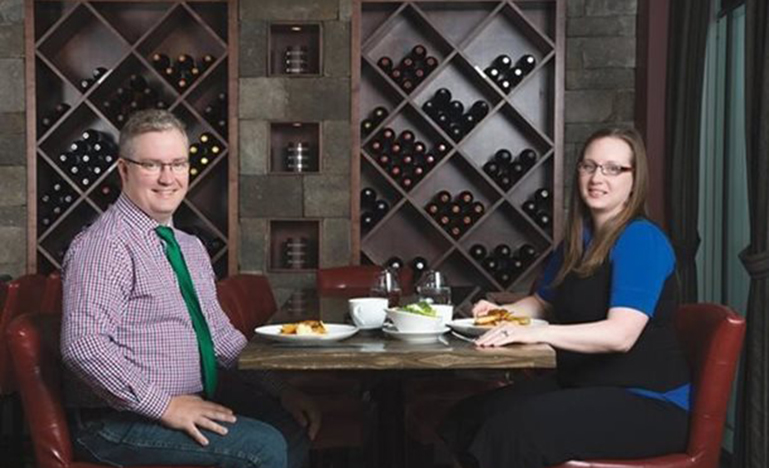Lunch with Jason Morris and Crystal Schening
At Vicky’s Bistro and Wine Bar, the lunch crowd is what you’d expect to see in Sherwood Park, an affluent suburb east of Edmonton. Suit-wearing professionals dine with colleagues or broker deals; young women in designer yoga pants catch up with friends. A handful are retired seniors or workers from the nearby construction site.

THE DINERS
The mentor: Jason Morris, Owner and Lawyer, Round Table Law, Sherwood Park, Alberta
Background: A former IT pro, Morris embarked on a second career as a lawyer in 2010, starting his own home-based, tech-savvy practice
The mentee: Crystal Schening, Lawyer and Notary Public, Kinetic Legal Services, Penhold, Alberta
Background: After working for a small firm and Legal Aid, Schening launched her own home-based practice this past summer
But in a quiet corner by the window, two diners defy easy categorization. Jason Morris and Crystal Schening are both professionals and stay-at-home parents, which means suits are optional and daytime yoga is unlikely. As work-at-home lawyers, they’ve chosen to balance careers in law with family life. Morris is a father of three and has been self-employed for about four years, not long after earning his JD at the University of Alberta in 2010. “It allows me to switch seamlessly from work mode to dad mode,” he says over a steaming bowl of soup. As an articling student, he discovered quickly that he was more interested in “being a dad than making partner.”
Schening, his former classmate, is just getting started. As a newly minted lawyer, she worked for others: first, as a junior lawyer at a small-town firm, and then as a legal services officer with Legal Aid. Last fall, she welcomed her first child and this summer she launched her own home-based legal practice. She turned to Morris recently to get some pointers.
“When you finish law school, you don’t know how to run a business,” she says. Over the past few months, she’s had to negotiate a laundry list of new business challenges: writing a business plan; building a website; securing insurance and professional licensing; setting up a home office; the list goes on. “It’s a steep learning curve,” she says.
Morris is all too familiar with how overwhelming this can be. Figuring out the most efficient way to run his practice — and the best strategies for incorporating technology — has taken years. “We come out of law school woefully unequipped,” he says.
This is perplexing to him, given that so many lawyers end up working for small firms or running their own practice. No wonder the attrition rates amongst Alberta lawyers is so high: within five years of being called to the bar, about half will move out of private practice and one-third will leave the profession entirely. “Too many of them can’t find a way to make it work,” he says.
The good news is that technology now makes it possible for lawyers to practise from home. A former IT professional, Morris initially created his own website with a log-in for clients to access their accounts. He now relies on ready-made tools to automate administrative processes.
“Buying things that work well is a more efficient thing to do than building them,” he says. He even uses a series of software programs to get clients to electronically sign retainer agreements.
But Morris is quick to point out that a law practice can’t be fully automated. There are still faxes to be sent and received, phone calls to make, and clients to meet “People still expect to meet their lawyer,” he says, noting that “house calls” are one of the benefits to hiring a home-based lawyer.
Even with his focus on automation, he uses a virtual assistant to deal with incoming faxes and take phone calls (via a virtual phone system) when he’s not available. Soon he plans to hire a bookkeeper, too, and advises Schening to do the same.
It takes time to learn the administrative ropes, build a self-sustaining referral engine, and even out the cash flow, says Morris. But one of the biggest lessons he’s learnt has been deceptively simple: “The time to ask for help is immediately,” he says. “Don’t wait.”


